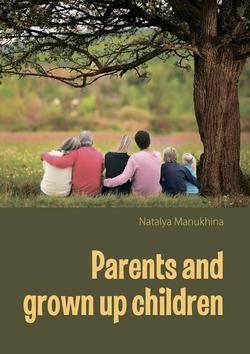Читать книгу Parents and grown up children - Natalia Manukhina - Страница 10
Part 1. Deep reflection
Separation in relations
ОглавлениеIn the Russian dictionary compiled by S. I. Ozhegov we read: “Separatism – a tendency to separation, isolation3”.
According to our observations based on our practice of working with clients and our own experience separation in relations is more than just separation, it is:
1. Interdependency and not independence;
2. Communication (of adults) and not absence of communication;
3. “Having mutual relationships with others” instead of being isolated from them. It is not a separation or isolation from other people but having equal relationships;
4. Through recognition of the value of “Oneself” and other people, arrangement of communication between “integral selves”;
5. Implementation of one’s plans considering that s/he is not alone but is in a mutual relationship with other people. This is willingness and ability to take into account: (a) what effect the implementation of one’s plans will have on their relations with those who are important to them, that is the people with whom they have long-term relationships; (b) How they will maintain and if necessary reorganize their relations in the process of implementing their plans; (c) How, despite different plans and circumstances, they will manage to maintain relations and not allow them to end;
6. The ability to maintain different kinds of relations (at the same time) with different people and systems, the ability to be flexible in different roles in order to establish different types of relationships;
7. It is not a mere separation, but a “separation for some reason”. This is separation for the purpose of establishing relations and not ending them.
Children may come back after their parents let them go, or they may protest – not against the fact that they were allowed to go, but against the form in which their parent did it.
Children may want separation, while their parents cling to them trying to prove to themselves and their children that they will always stay together.
Parents admit that without children their life, or the life they have as parents, will become meaningless. However, they have to accept and create their own life (establish relations with other people including their children) where they will have different roles and will be engaged in other fields than their family. They may find it very difficult after many years of dedicating all of their efforts to fulfillment of their parental responsibilities. That is why parents are often reluctant to let their children go, fearing that they will be abandoned.
Taking pride in their children and knowing that they have a share in their children’s achievements can make it much easier for parents to overcome the difficult period of separation. It is also important for parents to see that their children have become what they are thanks to them and it is thanks to them that they are able to live on their own instead of just being a branch of a tree planted by their parents.
Children subconsciously know that their parents were always there and will always be there, just like branches of a tree feel, though may not admit, that below them there is a trunk and roots. They live and grow, stretch out towards the sun and seem to avoid obstacles independently. Then they begin to sprout up and bloom, and finally bear fruit, but the fruit belongs not only to the branches, but to the whole tree.
Children are not afraid to reject their parents knowing that they will be always there. In fact they have internalized (imbibed their image and values) their parents and bear a little bit of them all their lives. Even when they “fall off” their parental tree like fruit or seeds, or autumn leaves they inherit many things from it, which they do not realize and that is why are not afraid to leave the tree.
Children find it difficult to recognize their independence and responsibility for their own lives, actions and emotional experience, so they prefer to hold their parents responsible for everything: “They did not teach me…”, “They made me do that, so I don’t want to do that again” or quite the contrary “I am used to that”.
Unfortunately, grownup children make similar accusatory monologues against their fiancés (fiancées) as well, which prevents them from getting married or leads them to a family breakup. If people get married in order to separate from parents their marriage is condemned to failure or will be filled with mutual reproaches, power struggle and rivalry. Moreover, it is possible to fix any kind of relations – transform, change or in extreme case end them – with the people with whom you are in a relationship, but not with others, because those will be different relations with different people. One can create new roles based on the experience gained from the same structural organization. We already know that, among other things, the relations between a parent and a child are vertical, while the relations between spouses are horizontal, which means that the mentioned two kinds of relations are differently directed
3
Hereinafter cited according to the edition: Ожегов С.И. Словарь русского языка. М., 1988.
